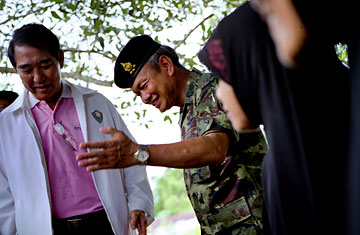
The royal project of Sufficiency Economy in Yala, Thailand, directed by Lieut. General Pichet Wisaijorn
The gourds grow heavy on the vine, and the catfish splash merrily in their ponds. At the Learning Center of Sufficiency Economy in Southern Thailand's Yala province, the vision of Thai agriculture as set out by the country's King Bhumibol Adulyadej has reached its fecund best. Like many other parts of Thailand, villagers come to this agricultural laboratory to learn from the monarch's Sufficiency Economy philosophy, which bundles together concepts of sustainable development, rural self-reliance and equitable income distribution. But there's a difference to this vast botanical project: unlike others in the rest of Thailand, this one is located in the country's Muslim-majority south, where suspicion of the Buddhist-dominated state has spawned a bloody insurgency that has claimed more than 3,700 lives, both Muslim and Buddhist, since 2004.
The patch of garden in troubled Yala is the brainchild of the Fourth Army Region Commander Lieut. General Pichet Wisaijorn, who is the military officer in charge of Thailand's far south. The area was once a Malay Muslim sultanate, but Thailand, then known as Siam, annexed the region in the early 20th century. Since then some Muslim residents, who make up roughly 80% of the local population, have complained of feeling like second-class citizens in what elsewhere is a predominantly Buddhist land. Sporadic violence in the deep south bloomed into a full-scale insurgency in 2004. Overtly Buddhist targets like monks and teachers have been murdered by shadowy perpetrators, while Muslims thought to be collaborators with the government have been killed as well. In recent months, the Thai government has unleashed a troop surge to try to quell the violence, which has, in turn, spawned criticism of the military's heavy-handed tactics like torture and arbitrary detentions of Muslims, according to human-rights watchdog Amnesty International.
But even as some 60,000 soldiers, police, paramilitaries and other government-backed militias patrol Thailand's three insurgency-wracked southern provinces, Lieut. General Pichet is focusing much of his personal effort on winning hearts and minds through the King's Sufficiency Economy project. The south is one of Thailand's poorest regions, and the Thai military says that thousands of villagers have willingly come to the center, mostly for one-day trainings on the merits of organic agriculture using a bio-fertilizer promoted by King Bhumibol. "Even within the military, some people believe I am wasting my time because they do not understand Sufficiency Economy," says Pichet, after showing off the benefits of composting to a group of local businesspeople. "But I believe that once villagers here understand that we are trying to help them help themselves, more and more will come over to our side."
But will lessons in crop yields truly ease tensions in Thailand's south? In the year since the gardening project was unveiled, the number of violent incidents in Thailand's deep south has only increased, despite army protests that this is a last-ditch, desperate campaign of terrorism from the insurgents. And while any overtly Buddhist undertones of the King's Sufficiency Economy theory have been stripped away in the south, there's no question that the royal economic philosophy draws succor from the Buddhist concept of the Middle Path. (Indeed, one fish-breeding program at the center was recently suspended because a Buddhist monk had opined that killing catfish for their sperm was unspiritual.) Says a Muslim academic who declined to be named for fear of offending the government: "We need justice for abuses committed by the state against our people, not Buddhist teachings on agriculture."
Unlike some of his more iron-fisted colleagues, Pichet has won grudging respect from some locals for attempting to promote sectarian harmony through military overtures. As he gave a rambling slide-show lecture on Sufficiency Economy to members of a local chamber of commerce (some of whom snoozed in the tropical heat), there was no doubting the commander's sincere belief that the project would promote the Thai nation's cause in the south. Meanwhile, elsewhere in the complex, young Buddhist army officers earnestly gave lessons on proper fertilizer use to groups of veiled Muslim women, some of whom were completely covered but for their eyes. (The area of Malaysia bordering Thailand's Yala province is among the most conservative in that Southeast Asian nation, and the local Kelantan state government draws inspiration from Islamic Shari'a law.) In another area, under the shade of some trees, a group of young Muslim drug addicts underwent a Koranic-inspired rehabilitation program while Thai soldiers looked on.
Pichet dismisses allegations that his men might be part of the problem in Thailand's south. When asked about the Amnesty International report released earlier this year documenting systematic military abuse of local civilians, the Fourth Army commander first says he has never heard of the report, then switches tactics and claims that the group's researchers didn't spend much time in the south collecting their information. Pichet acknowledges that the hearts and minds of suspicious Muslim villagers can't be won overnight. But the country still faces a tough battle in its bloody south, no matter how impressively the papaya and rubber trees grow.
